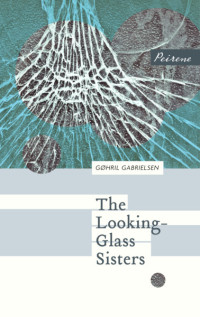I am more than I can dream of

The Looking-Glass Sisters
by Gøhril Gabrielsen
translated from Norwegian by John Irons
Once again, I feel that I haven’t given a Peirene book a fair chance. These short novels are intended to be read in a single sitting and those I have read in a couple of large chunks do seem to be those I have enjoyed more. I haven’t had huge chunks of free time lately, so my reading has been split into 20 minutes here and there, which I don’t think really does any book justice.
But I digress. I should tell you about this book.
It’s the story of two middle-aged sisters, Ragna and her younger sister, who narrates the book. The narrator suffered a childhood illness that has left her body severely weakened, so that she never leaves the house and is largely dependent on Ragna. They have lived together alone since the death of their parents and their relationship is bitter and twisted, but it works…until a man comes into Ragna’s life. Johan upsets the delicate balance, revealing alternative paths for the sisters.
“Here, where the sun moves unceasingly across the sky all summer, I am more than I can dream of. And I smoulder like old firewood when the sun is below the horizon all winter. I have a special ability to cling on, to live in what is there.”
You could hardly get a more unreliable narrator. Her incapacity sometimes traps her in her bedroom, so she has learned to entertain herself with her imagination. Her illness sometimes gets so bad that she sleeps for days, or stops eating. She is paranoid – or is she right to fear Ragna’s wrath?
“I will therefore make a tear, a hole in my life perspective, to search for a way to admit that what I experience is possibly neither correct nor true. I will be open to everything that streams out of this hole, open to thoughts that I live a quiet, simple life, a life without the dramas with which I tend to embellish every occurrence.”
The sisters do not treat each other well. They are in a horrible situation. They’re very poor, living essentially off the land (in autumn Ragna goes hunting and then sells the meat and fish). Ragna has all the weight of responsibility, and her sister doesn’t make it easy. They scream abuse at each other, kick and scratch, but ultimately Ragna is the only one with power.
“I exist. So pitiable and pathetic. I have swaggered out armed with two perverted words that suddenly fall to pieces, ashamed of their own alleged strength. I regret this, change the statement to a stuttering I exist?, for that’s the state of affairs now, with me clutching my crutches and whimpering, ‘Ragna, help me.’ “
This could have been a relentless, hard book about poverty and illness, but as the title suggests, Gabrielsen has imbued the whole with a fairy tale quality. The northern Norway setting means the story moves from 24-hour daylight to 24-hour darkness and back again. The narrator is in many ways a prisoner, but when the “prince” comes along he’s not there to rescue her but for Ragna. The story recognises that Ragna too is trapped by family duty. In another life she might have been a waitress or a shopgirl, able to speak to different people all day every day, instead of being trapped in a life she doesn’t want.
Both sisters have become so bitter, it’s painful. But this is at no point a hard book to read. It’s beautiful. The narrator toys with language, playing with words. It really is a feat of ingenuity that has made this work so well in translation. Kudos to John Irons.
Svimlende muligheter, ingen frykt published 2008 by H Aschehoug.
This translation published 2015 by Peirene Press.
Source: I subscribe to the publisher.